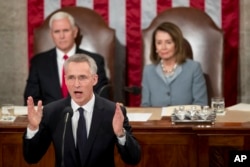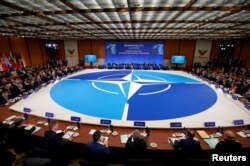U.S. Secretary of State Mike Pompeo told NATO foreign ministers Thursday the 29 nation alliance must alter its approach to developing threats throughout the world.
"We must adapt our alliance to confront emerging threats ... whether that's Russian aggression, uncontrolled migration, cyber attacks, threats to energy security, Chinese strategic competition ... and many other issues," Pompeo said.
Pompeo delivered opening remarks to the foreign ministers as they met in Washington for a second day to commemorate the 70th anniversary of NATO.
The two-day gathering has been marred by differences over security and other issues. A disagreement with Turkey has intensified over its plans to buy a Russian air-defense system, and the U.S. has repeated demands for allies to increase their defense spending.
NATO Secretary-General Jens Stoltenberg warned the U.S. Congress Wednesday of the threat of a "more assertive Russia," saying the West's key military alliance is not looking to start a new Cold War with Moscow but needs to deter its military aggression.
In an unprecedented address to a joint session of Congress on the 70th anniversary of NATO's creation at the end of World War II, Stoltenbergalso said NATO "has no intention of deploying land-based nuclear missiles in Europe."
He accused Russia of violating the Intermediate-Range Nuclear Forces Treaty, which the U.S. says it is leaving because of Russian violations — a claim Russian has denied.
"We do not want to isolate Russia. We strive for a better relationship with Russia," Stoltenberg said. "But even with a better relationship, we still need to manage a difficult one."
He said "NATO will always take the necessary steps to provide credible and effective deterrence."
Stoltenberg also called on NATO allies to spend more on defense, to meet the Western alliance's goal of each country spending at least 2 percent of the size of its national economy on defense by 2024, a standard only eight NATO countries currently meet.
He credited U.S. President Donald Trump, who once called NATO "obsolete," with pushing NATO countries to increase their defense spending and said, "It has had a real impact."
A two-time Norwegian prime minister, Stoltenberg acknowledged differences among the NATO countries on trade, energy, climate change and other issues, but said, "This is democracy. It's not a sign of weakness. It is a sign of strength."
House Speaker Nancy Pelosi and Senate Majority Leader Mitch McConnell invited the NATO leader to speak to members of the Democratic-controlled House and the Republican-controlled Senate to show bipartisan support from lawmakers in spite of Trump's ongoing criticism of NATO.
As foreign ministers of NATO gather in Washington, foreign policy analysts -- and Stoltenberg in his address to Congress — are emphasizing it is one of the most successful military alliances in history and still relevant.
"NATO is adapting and allies are spending more on defense," Mark Simakovsky of the Atlantic Council told VOA. "And I think this [Trump] administration is understanding more and more how critical NATO is to some of the challenges that it faces, including China. So, in many ways, NATO is far from obsolete."
Trump's criticism that NATO members aren't spending the required 2 percent target, as well as political upheaval in Europe — including the impending British exit from the European Union — and calls by some to kick Turkey out of NATO, can leave the impression, however, that the defense alliance is fracturing.
"I don't think that's the case. The alliance is strong," Estonian Defense Minister Juri Luik told VOA, pointing to increased political dialogues and military exercises among NATO's members, as well as more U.S. military equipment and troops being brought to Europe.
Trump took credit Tuesday for pushing other NATO countries to spend more on defense, but criticized Germany, Europe's biggest economic power, for not doing more. Berlin now plans to spend 1.5 percent by 2024, missing the 2 percent NATO target.












